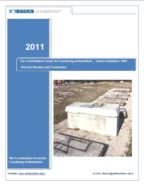Fonte:
www.antisemitism.org.il
The report is based on data gathered and published on the Forum’s website. Naturally, the number of incidents published in the report is not a reflection of all the incidents that actually occurred, and sometimes the details differ from those published by the various Jewish Communities. Nonetheless, the data does as a rule reflect what, in our view, constitute the trends.
The high level of the reported Antisemitic incidents was maintained in 2011, including those of a violent nature. This also takes into account the absence of an event that acts as a “trigger’ in the dispute between Israel and its Arab neighbors/Palestinians. While over the last two years the high levels of Antisemitism on the part of Moslem elements has been maintained and also its well recognized features, an increase has occurred this year in the level of Antisemitism and its extent among elements on the extreme right. It is estimated that one of the factors having a bearing on such an increase is the world economic crisis which worsened in 2011.
As in the past, the leading countries with the highest rate of Antisemitic incidents in general and in terms of violence in particular, are those countries containing the largest Jewish Communities: USA, France and Britain. Along with them, there are other countries in Western Europe, including Holland and Belgium in which the challenge to the day to day existence of these communities is an ever-increasing one.
The trend of the strengthening of the extreme right in Europe has continued. This is expressed in the spread of nationalistic sentiments, mainly among the young people opposed to immigration. There has been a substantial increase in the level of violence principally against foreigners, but also against Jews. The economic crisis haunting the world also acts as a factor that sustains and acts as a spur to Antisemitic activity singling out the Jews as bearing responsibility for the deteriorating situation. Prominent countries in which, in 2011, the level of such events has increased and the number of them, on the part of rightist elements, include: USA, Germany, Russia, Poland, and Ukraine.
The campaign for the de-legitimization of Israel continued and even strengthened in 2011, involving Moslem elements, Palestinians, the extreme left and in certain places, also extreme right-wing organizations. This year the BDS (Boycott, Divestment and Sanctions) activity intensified all over the world. This was expressed in the form of demonstrations and calls for the imposition of an economic-trade and academic boycott on Israeli companies and institutions, and is reflective of an anti-Israeli public discourse that grew in strength in 2011. However, the feature of the year was the failure of the BDS organizations worldwide to create a broad front of supporters as a lever for “strategic” events (such as the “flotillas” and “flightillas”) with the object of tightening the boycott and sanctions on Israel. Because of this, the main focus of the leaders of the BDS movement was aimed at stores selling Israeli products. The de-legitimization of Israel activities make harming the Jews more “acceptable” and exposes the Jewish Communities worldwide, more so than in the past, to violence and terrorism.
Iran continues to view Antisemitism as a strategic tool for challenging Israel’s standing and it is operating on two main levels: the first – the declarative level including virulent anti-Israel statements, and the second, in the field, in terms of action to strengthen its circles of influence by directing and encouraging various elements (Moslems, extreme right-wing and extreme left-wing elements), in the carrying out of defamatory anti-Israel and Antisemitic activity. Such activity is particularly common in Latin America, as well as in Europe.
The “Arab Spring” acted as a catalyst for increasing Antisemitic manifestations and also laid bare the basic hatred of the Arab public in these countries, towards the Jews. In practical terms, after the fall of the Ben-Ali regime in Tunisia, the Jewish Community experienced, over a short period, a series of Antisemitic incidents, although it should be stressed that these incidents were also roundly condemned after governmental authority had been stabilized locally.
Due to the direct and proven link between the Israeli-Palestinian conflict and the level of Antisemitism, it is reasonable to assume that in scenarios of an escalation in the Middle East, an exacerbation can be anticipated in the gravity (level of violence) of Antisemitic incidents and in their scope.


